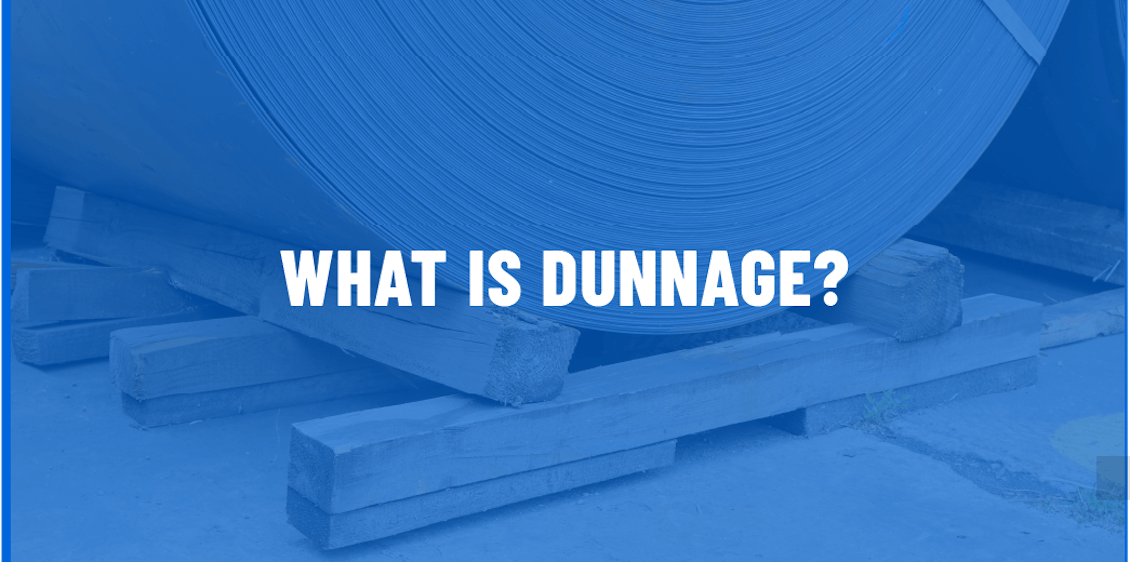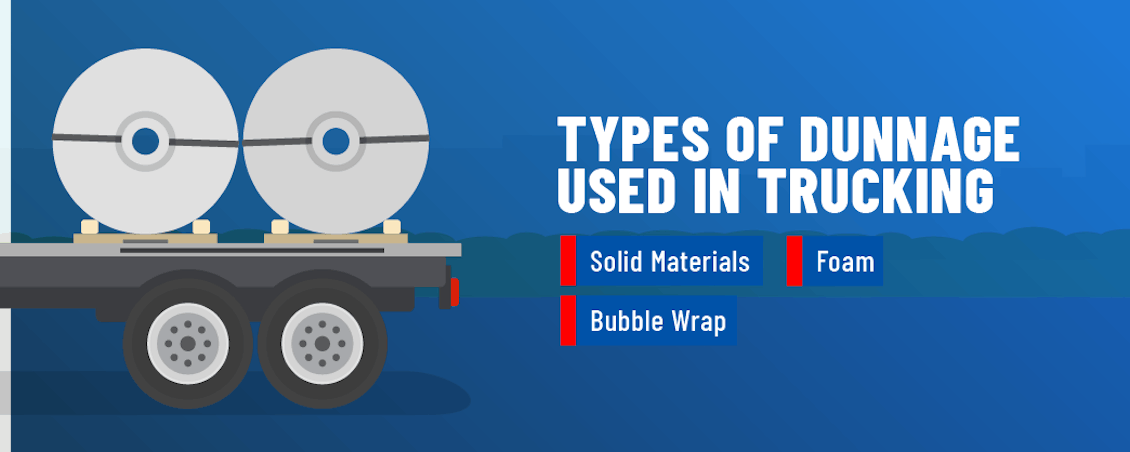What is Dunnage in Trucking?
September 27th, 2023

In the world of trucking and logistics, ‘dunnage’ plays a vital role in the safe and efficient transportation of goods. So, what exactly is dunnage in trucking? It’s the unsung hero – various materials used to secure and protect cargo during transport. Whether you’re an experienced logistics manager, a trucking professional, or a newcomer in the field, understanding dunnage and its implications is essential for smooth sailing in your operations.
Shipping dunnage prevents cargo damage, improves efficiency, and ensures a safe voyage for transportation. Whether you’re packing a large shipping container or securing a small load on a flatbed truck, get ready to explore the world of dunnage and discover the cargo-saving tricks of the trade.
Understanding Dunnage in Trucking
Dunnage encompasses a variety of materials such as wood, plastic, air pillows, and bubble wrap, all serving as a protective buffer for cargo during transportation. Its main purpose is to maintain the stability of goods, preventing any movement and potential damage. Effectively using dunnage in trucking ensures that the cargo reaches its destination in the same pristine condition it was loaded.
Beyond safeguarding goods, dunnage plays a significant role in optimizing the loading capacity of trucks, leading to enhanced efficiency in transport operations. By filling in empty spaces and preventing cargo shift, dunnage guarantees that every square inch of a truck’s cargo area is utilized to its fullest potential.
Significance of Using Proper Dunnage to Prevent Damage
Proper dunnage use ensures stability during transit, reducing the risk of accidents caused by shifting loads. Additionally, it keeps goods secure and undamaged, minimizing financial losses associated with damaged cargo and potential claims or penalties.
Imagine a truck carrying electronic equipment lacks proper dunnage support. A sudden jolt or sharp turn causes the cargo to shift, leading to potential damage due to inadequate cushioning and support. With the right dunnage in place, this situation could have been avoided, saving the business from costly replacements or repairs.
Dunnage not only protects your cargo but also enhances safety and cost-effectiveness, making it an indispensable asset in the trucking industry.
Using Dunnage: A Practical Approach
While understanding the concept of dunnage is essential, it’s equally critical to know how to use it effectively. The proper application of dunnage involves:
- Analyzing the type of cargo: Fragile items might need soft cushioning materials, while heavy machinery may require solid blocking or bracing.
- Considering the shipping route: Long-distance or rough terrain might call for more secure dunnage arrangements.
- Understanding the vehicle’s design: The type of vehicle—be it a flatbed trailer or a closed container—will dictate the appropriate dunnage solutions.
Types of Dunnage Used in Trucking
In the complex world of logistics, there’s rarely a one-size-fits-all solution for anything, and that’s especially true for dunnage. Depending on the nature and size of the cargo, logistics companies use different materials to ensure the safe transportation of goods. Here’s a look at several common types of dunnage and their specific applications in the trucking industry.

Solid Materials
Solid materials such as wood or plastic are used for heavy-duty dunnage needs. These materials are typically fashioned into pallets, blocks, or bracing systems to support larger, heavier items during transit.
Think of a flatbed truck carrying large machinery—solid wood or plastic dunnage would be used to secure the machines and distribute their weight evenly across the trailer bed. In addition to ensuring safety, these types of dunnage materials also enhance load stability, facilitating more efficient stacking and shipping.
Bubble Wrap
Bubble wrap is another popular type of dunnage, especially when transporting fragile items. Each air-filled bubble serves as a miniature cushion, absorbing shocks and vibrations that can occur during transit.
Bubble wrap is incredibly lightweight, and provides excellent protection without adding significant weight to the cargo. Whether you’re shipping delicate glassware, electronics, or other breakable items, bubble wrap can provide a protective cocoon to minimize the risk of damage.
Foam
Foam dunnage comes in various forms, including sheets, inserts, and custom molded pieces, making it a versatile choice for a wide range of cargo. Foam’s adaptability is its greatest strength. If you’re shipping items with unusual shapes or sharp edges that could potentially damage other cargo, foam’s ability to be custom-cut or molded offers superior protection during transit.
Kraft Paper
When it comes to gap filling and lightweight cushioning, kraft paper dunnage is hard to beat. This type of dunnage can be crumpled up and used to fill voids in packages, effectively preventing items from moving during transport.
Kraft paper can also be wrapped around individual items for added protection or used to create separation layers between different types of goods. It’s a cost-effective and environmentally friendly dunnage option, making it a popular choice in the trucking industry.
Air Pillows
Last but not least, air pillows are another useful type of dunnage. These inflatable plastic bags are lightweight, reusable, and perfect for filling voids in packaging. What sets air pillows apart is their flexibility—they can be inflated to varying degrees to fit any size or shape of cargo, providing a customized cushioning solution.
Whether you’re shipping a small, fragile item or packing a large truck, air pillows can effectively keep your goods secure and damage-free.
Benefits of Using Dunnage in Trucking
The use of dunnage in trucking has numerous benefits that contribute to the efficiency and safety of cargo transportation. Here are the key advantages in detail:
- Cargo Protection: At its core, the primary purpose of dunnage is to protect cargo during transit. By filling up empty spaces and providing a cushion against bumps and shakes, it significantly reduces the risk of damage.
- Load Stabilization: Dunnage helps to stabilize loads during transportation. It keeps the goods in place, preventing them from shifting or toppling, which could otherwise lead to accidents or damaged goods.
- Weight Distribution: Items like pallets or blocks help distribute the weight of the cargo evenly across the vehicle’s bed, preventing undue stress on any single part and making the ride smoother and safer.
- Compliance with Regulations: Many shipping and transportation regulations require the use of dunnage to ensure safety. By using proper dunnage, businesses can stay compliant and avoid potential penalties.
- Cost-Efficiency: While there is a cost involved in getting the right dunnage, the potential savings from avoiding damaged goods and maintaining compliance far outweigh these costs.
- Versatility: With a range of options available from foam and bubble wrap to wooden pallets and air pillows, dunnage can be chosen to match the specific requirements of the cargo, offering flexible solutions for different types of goods.
Factors to Consider When Choosing Dunnage for Trucking
When it comes to selecting the right dunnage for trucking, several factors need to be considered. Here’s a comprehensive list of what you need to keep in mind:
- Type of Cargo: The nature of the goods being transported is paramount in deciding the type of dunnage used. Fragile items might need bubble wrap or foam for cushioning, while heavier items might require solid materials like wood or plastic for support.
- Weight of the Cargo: The weight of the goods can also influence the choice of dunnage. Heavier items would need stronger, sturdier dunnage, while lighter goods could be served well by lighter dunnage like air pillows or kraft paper.
- Mode of Transport: Consider the item’s entire route and mode of transport: Whether by road, sea, or air, the method of transportation dictates the appropriate type of dunnage. For instance, sea shipments may require waterproof dunnage to safeguard the cargo from moisture damage.
- Journey Distance: Longer journeys with more chances for bumps and jostling might require more robust and cushioning dunnage compared to shorter, smoother trips.
- Cost: The price of dunnage can vary widely, and your budget might influence your choice.
- Reusability: Some types of dunnage, like plastic bins or pallets, can be reused, offering cost savings over time.
- Environmental Impact: Companies may also want to consider the environmental footprint of their dunnage. Options like recycled paper or biodegradable materials can be more eco-friendly.
FAQ
What does dunnage mean on a flatbed?
On a flatbed truck, the term ‘dunnage’ refers to materials used to protect and secure the cargo during transport. Flatbed dunnage is especially important for distributing the weight of the cargo evenly across the bed and preventing any damage that could occur due to movement during the journey.
Are pallets considered dunnage?
Yes, pallets are indeed considered dunnage. They’re often used to provide a sturdy and solid base for goods, aiding in the secure stacking of items and the even distribution of weight during transport.
Learn More with Hale Trailer
At Hale Trailer, we’re all about providing you with the information and resources you need to make informed decisions for your trucking needs. Want to know more about dunnage, or looking for the right trailer for your requirements? Explore our services and browse our extensive trailer inventory. Whether you’re going around the block or across the country, our team is always available to support your trucking needs.
All the information on this website – https://www.haletrailer.com – is published in good faith and for general information purposes only. Hale Trailer Brake and Wheel does not make any warranties about the completeness, reliability and accuracy of this information. Any action you take upon the information you find on this website, is strictly at your own risk. Hale Trailer Brake and Wheel will not be liable for any losses and/or damages in connection with the use of our website.
